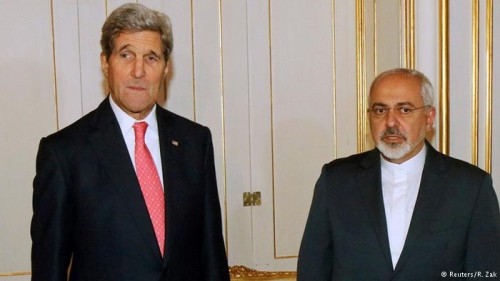PHOTO: US Secretary of State John Kerry and Iranian Foreign Minister Mohammad Javad Zarif, January 2015
LATEST
Summarizing the latest round of talks with the 5+1 Powers for a nuclear agreement by June 30, Iran’s lead negotiator has cautiously spoken of the lack of trust.
Deputy Foreign Minister Abbas Aragchi said on State TV on Saturday:
Distrust underlies these negotiations, and this is a reality. We don’t trust the other side at all and the other side doesn’t either.
Therefore, all measures in the agreement will be in a way that if any side feels that the other side is violating its undertakings, it can return and implement what had existed before the deal.
Iran and the 5+1 (US, Britain, China, Germany, Russia, and France) have had six round of talks to draft the final text of an agreement, following the declaration of a framework on April 2. The latest discussions among political deputies ended late Friday night in Vienna, although technical experts are continuing the process.
Araqchi said that the main text of a deal will be about 20 pages. There will be five annexes, of about 40 to 50 pages, on sanctions, technical issues, peaceful nuclear cooperation with Iran, a joint commission, and executive affairs.
The Minister said, “Different parts of this text and its annexes are still in parentheses. Some of them are a source of difference, yet this task is moving ahead, although very slowly.”
Iranian Foreign Minister Mohammad Javad Zarif reiterated on Saturday that there should be no significant changes in conditions in the final text:
The frameworks that we reached as a solution in Lausanne are fully clear and I believe that attempts to breach those frameworks by the western side are fruitless and only kill time.
If they want to raise excessive demands, they will not reach results but if they want to work based on the agreed basis, then there will be a high possibility for attaining results.
He indicated that the deadline of June 30 might be extended, “We have always said that the content is important to us and we don’t confine ourselves to time and aren’t concerned about it.”
Senior Official Rezaei Denies Iran Sending Troops to Syria
The Secretary of the Expediency Council, Mohsen Rezaei, has denied reports that Iran is sending thousands of troops to prop up Syria’s Assad regime amid recent rebel victories.
Rezaie said on Sautrday, “Iran’s policy on Syria crisis has been clearly made from the beginning.”
The head of Iran’s elite Qods Force, General Qassem Soleimani, visited Syria in late May after rebels swept through Idlib Province in the northwest and threatened further moves on Latakia, Hama, or Aleppo.
Drawing on a report from the Iranian paramilitary organization Ansar-e Hezbollah, Arab newspapers claimed Iran was considering the intervention of up to 50,000 Iranian, Iraqi, and Afghan fighters. An Assad regime official said 7,000 had arrived, with a goal of 10,000 to defend Damascus and retake parts of Idlib Province.
See Syria Feature: Is Iran Really Preparing to Send 50,000 Troops to Save Assad?
Rezaei insisted, “Iran’s aid to regional countries has always been of a humanitarian nature.”

